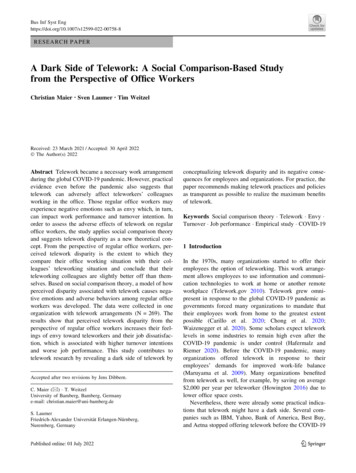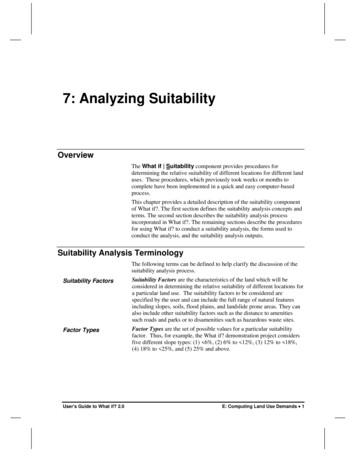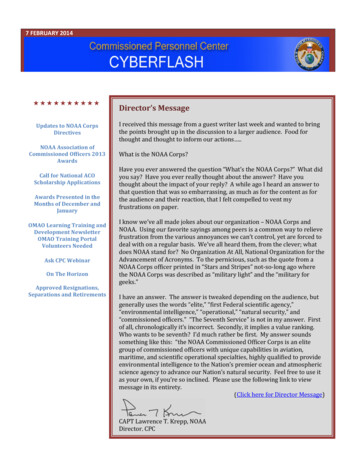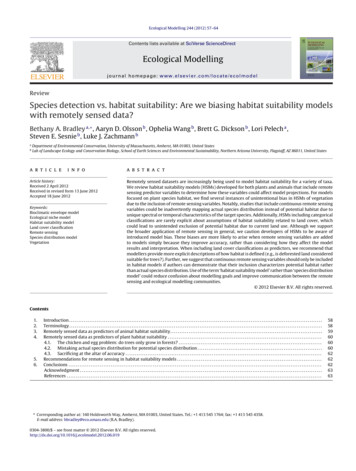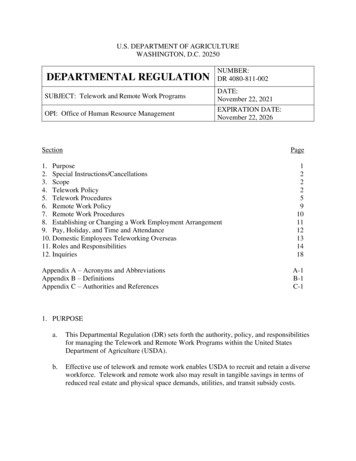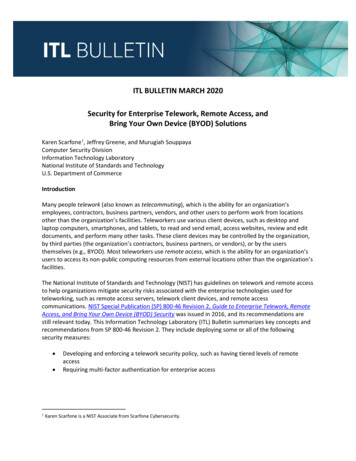
Transcription
Telework SuitabilityToolOffice of Financial ManagementApril 20181
How to Determine Telework SuitabilityThis document will help you determine whether telework for a particular position is suitable. Once adetermination is made, employees should be made aware of the reasons for the determination.Telework determinations can be made at three levels: the potential at the job classification level, thesuitability of the position for telework and the approval of the employee.Follow the guidance below to make determinations at the position level and for an employee.Step 1A suitable position is defined as a position that has responsibilities that can be, at any given time, conductedfrom a remote location without affecting service quality or organizational operations. This analysis is basedon the work to be done, not on the employee.Determine suitability of a position by asking:Can any of the job duties be done anywhere other than the office?Yes SuitableNo UnsuitableORDoes the position require daily 100% on-site performance of work?Yes UnsuitableNo SuitableExamples of responsibilities that are suitable for teleworking: accountinganalyzing dataauditing reportscalculatingcomputerprogrammingphone workdata entrydesign workdrafting editingevaluationsgraphicswork planningpreparing budgetsprogramming andmonitoringcontracts project management reading1 report writingresearchsoftware developmentspreadsheet analysistypingword processingweb trainingwriting
If the position is classified “unsuitable” consult with the appointing authority of the division forconcurrence. If the decision remains, inform your Human Resource consultant. (This process can alsobe conducted by HR.)Step 2This analysis is based on the employee if the employee works in a position that is suitable forteleworking. Employees in suitable positions can volunteer to participate in the telework program.Once the position has been determined suitable, an interested employee working in that position cantake a self-assessment (example below) before making a request for teleworking to see if they are agood candidate for the arrangement.The supervisor approves the teleworking arrangement for the employee. Supervisors should review thecharacteristics of a successful teleworker, listed below. Have a conversation with the employee with a“start from yes” or “let’s try it” approach.Base approval on performance. The employee should have no active, formal disciplinary and/orcorrective actions on file for the current or immediately preceding appraisal period. Act upon therequest within two weeks or whatever you agency policy suggests.Characteristics of a good teleworker: Has a full understanding of theoperations of the organization Trusts supervisors Establishes priorities and manages time Likes to work independently Writes a to-do list for each workday Schedules/plans work ahead Knows job goals and objectives Keeps in touch with supervisor Informs supervisor when a deadlinecan’t be metRequires minimal supervisionRequires minimal social interactionHigh level of job knowledge and skillPrefer alternative officeenvironments at least sometimeIs self-motivatedWants to teleworkIs well organizedDemonstrates a high level of productivityComfortable working aloneHas a reliable work historyIf the employee will be approved for telework, ask the employee to follow the agency approvalprocesses defined in agency policy or directed by management.If an employee will not be approved for telework for reasons other than performance, it isrecommended you consult with your HR consultant before talking to the employee. If thenonapproval is due to performance, it is recommended the supervisor consult with their directmanager for concurrence. If the decision is affirmed, it is then recommended you inform theappointing authority and consult with your HR consultant before talking to the employee.2
Telework Employee Determination Checklist Tool(to be completed by supervisor)This tool will assist in determining whether telework is appropriate for an employee. If the answer to any ofthe following questions is “no,” it is suggested that telework is not an appropriate option. Please consult theHR consultant if a “no” is selected. Attach all documents to support your “no” answer(s).1.The employee is self-motivated and responsible.Yes No 2.The employee is able to work independently.Yes No 3.The employee is familiar with the job requirements.Yes No 4.Many of the employee’s duties may be performed remotely.Yes No 5.The employee is aware of the agency’s procedures.Yes No 6.The employee meets standards in his/her current position.Yes No 7.The employee is an effective communicator.Yes No 8.The employee is not currently serving a probationary trial or service ortransition review.Yes No 9.The employee has not received corrective or disciplinary action in thelast year.Yes No 10.The supervisor is committed to discussing expectations of the teleworkday with the employee.Yes No 3
Telework Employee Self-Assessment Tool(to be completed by employee seeking telework arrangement)A successful telework employee has a job suitable for telework and a telework-ready office.Read each of the sections below and check the box that most accurately describes you or your situation. Your self-assessment willhelp you decide whether telework is right for you.1. Successful telework employees develop regular routines and are able to set and meet deadlines. Areyou self-motivated, self-disciplined and able to work independently? Can you complete projects ontime with minimal supervision and feedback? Are you productive when no one is checking on youor watching you work?Always Usually Sometimes Not really 2. Telework employees have strong organizational and time-management skills. Are you resultsoriented? Will you remain focused on your work while teleworking and not be distracted bytelevision, housework or visiting neighbors? Do you manage your time and workload well, solvemany of your own problems and find satisfaction in completing tasks on your own? Are youcomfortable setting priorities and deadlines? Do you keep your sights on results?Always Usually Sometimes Not really 3. Telework employees are comfortable working alone. Can you adjust to the relative isolation ofworking at home? Will you miss the social interaction at the central office on your telework days?Do you have the self-control to work neither too much nor too little; can you set a comfortable andproductive pace while working at home?Yes No 4. Telework employees should have a good understanding of the organization’s “culture.” Are youknowledgeable about your organization’s procedures and policies? Have you been on the job longenough to know how to do your job in accordance with your organization’s procedures and policies?Do you have well-established work, communication and social patterns at the office?Yes No 5. Telework employees should have effective working relationships with coworkers. Have youdetermined how to support coworkers while working at home? Have you and your supervisorevaluated the effects of your telework days and those of your coworkers in maintaining adequate inoffice communication?Yes No 4
6. Telework employees need to be adaptable to changing routines and environments. Have youdemonstrated an ability to be flexible about work routines and environments? Are you willing tocome into the central office on a regularly scheduled telework day if your supervisor, coworkers orcustomers need you there?Yes No 7. Telework employees need to be effective communicators and team players. Do you communicatewell with your supervisor and c-workers? Are you able to express needs objectively and developsolutions? Have you developed ways to communicate regularly with your supervisor and coworkersthat you can use when you telework?Yes No 8. Current job performance is a strong indicator of your potential success as a telework employee.Consider how any problems or developmental needs might affect your telework experience. Are yousuccessful in your current position? Do you know your job well? Do you have a track record ofperformance?Yes No 9. Do you have the right job for telework? Job responsibilities that can be arranged so there is no difference in the level of serviceprovided to the customer. Minimal requirements for direct supervision or contact with the customer. Few face-to-face communication requirements with the ability to arrange days whencommunication can be handled by telephone or email. Minimal requirements for special equipment. Ability to define tasks and work products with measurable work activities and objectives. Ability to control and schedule workflow.10. Do you have an appropriate telework environment? A safe, comfortable workspace where it is easy to concentrate on work. The level of security required by the agency. The necessary office equipment and software that meet agency standards. A telephone, with a separate home office line if required, and an answering machine orvoicemail. Household members who will understand you are working and will not disturb you.Are you the right kind of worker? If your answers to Questions 1 through 8 are “Always,” “Usually” or“Yes,” you’re the kind of employee likely to be successful at telework.Do you have the right kind of job? You should be able to check every bulleted item under Question 9.Do you have the right home environment? You should be able to check every bulleted item underQuestion 10.5
Telework Employee Self-Assessment Tool (to be completed by employee seeking telework arrangement) A successful telework employee has a job suitable for telework and a telework-ready office. Read each of the sections below and check the box that most accurately describes you or your situation. Your self-assessment will
